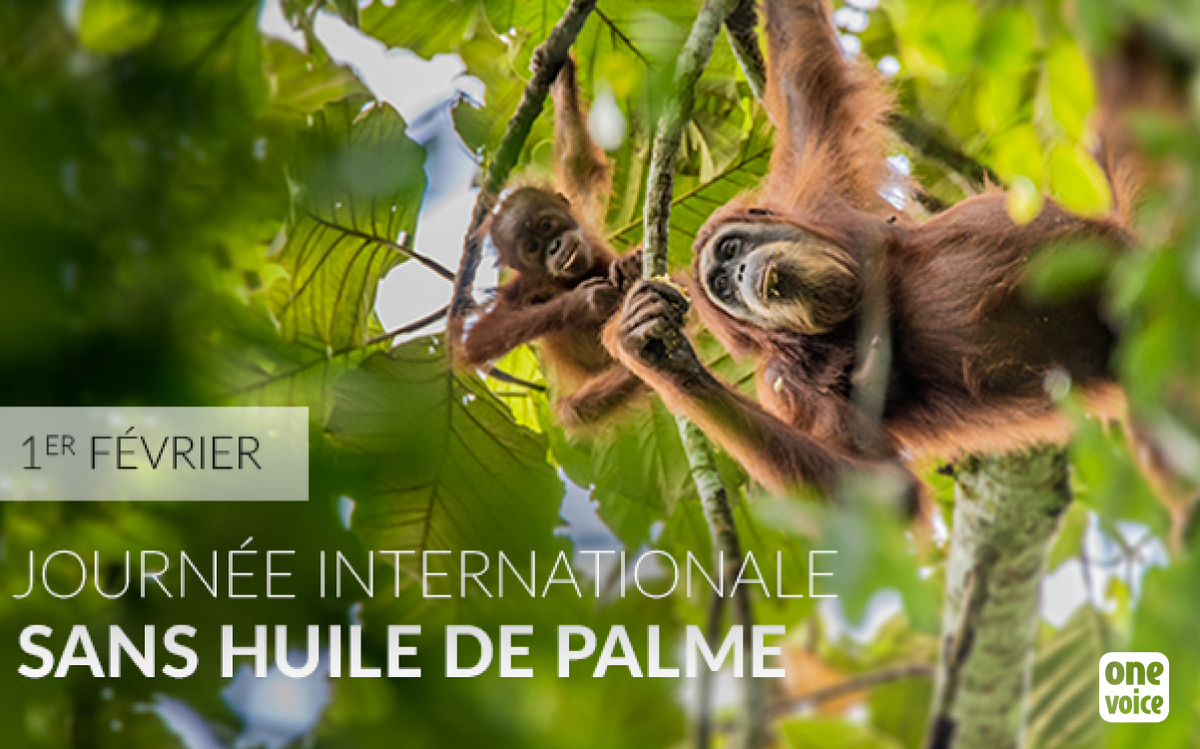

February 1st, join with One Voice against palm oil!
One Voice, in an international collective of associations [1], is a partner of the International Palm Oil Free Day on February 1st. Objective: to inform everyone about the tragedy of this production and to mobilize Internet users by an original Facebook challenge.
A wild life disaster
Tropical forests are melting like polar ice caps, faster than in Brazil. Between 1990 and 2010, 8.7 million hectares of forest [2] were razed
to the ground in Indonesia, Malaysia and Papua New Guinea for oil palm crops. At this rate of constant deforestation and along with the additional ecological consequences to the climate, the animal populations that the forests shelter will disappear in only two decades. This means, from Sumatra to Borneo, the extinction of a unique variety of wildlife in the world: orangutans, gibbons, tigers, elephants, rhinos, Malayan bears (on the island of Sumatra alone, 10,000 plants including 17 endemic genera, 600 resident or endemic
bird species and 200 mammals are also concerned).
The palm, is it academic?
In the Americas (Colombia in particular), in Africa (Nigeria, Ivory Coast) and especially in South-East Asia, a vegetable oil is extracted from the pulp of its fruits (palm oil) or from its almonds (palm kernel oil). 85% of the world’s production of this vegetable oil (65 million tonnes, more than twice that of rapeseed, sunflower and soya combined) comes from Indonesian and Malaysian plantations alone. It feeds three sectors: food industry (80%), cosmetics (19%) and energy (1%, and yes, we deforest there to produce biodiesel here, it’s the world village).
At a low cost and some texture properties (its high content of saturated fatty acids favouring the risk of cardiovascular disease is not put
forward), palm oil is everywhere in our supermarket shelves: chocolate spreads and pasta, biscuits and cereals, baby milk, canned sardines, soaps, mayonnaise, chips, freeze-dried soups, ready meals … In 2013, a French person consumed 2.8 g per day [3].
A challenge for the planet and animals!
For the International Palm Oil Free Day, One Voice invites you to log on to https://www.facebook.com/events/312655225795249/. Among other fun or informative resources, you will find every week of February guaranteed cooking recipes without palm oil, for snacks, aperitif or meals, alternative care products or maintenance, information on the international label carried by the collective (www.gopalmoilfree.com) and links to sites of products labelled 100% without palm oil. Consumers, look, like, join … It will be a first step forward.
[1] On the initiative of
Jakarta Animal Aid Network and the Dutch association EDEV (An animal,
A friend).
[3]
according to a study of the Research Center for the study and
observation of living conditions